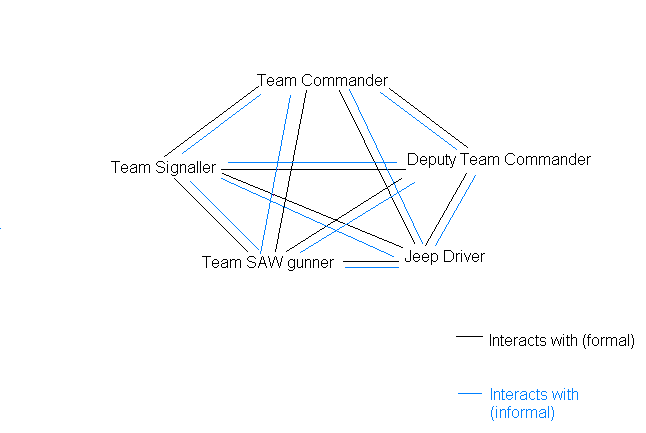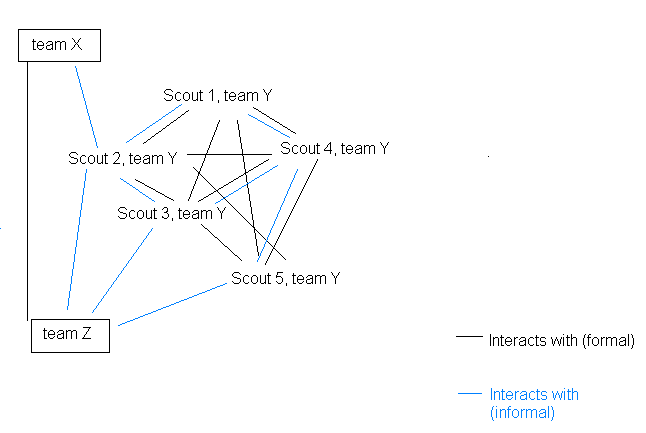In this section, we will discuss about the control of management (higher authority) over the scout platoon and the internal relationships that exist in the platoon itself. Here, we begin to see sources of conflict in a seemingly coherent platoon.As mentioned under the section on management, the scout platoon in 3 SIR is answerable only to one higher authority-- that of the Intelligence Officer (S2). All other commanders in the regiment do not have direct authority over the platoon; however, as rank heirarchies are strictly adhered to in the Armed Forces, any scout trooper caught disrespecting an officer or senior Specialist is severely dealt with.
Nevertheless, "Outsiders", as the other officers (with the exception of the Commanding Officer of the regiment) and specialists are often refered to, are generally treated with "superficial" respect to their rank and authority. What this means is that the men, like the workers described by Roy's and Burawoy's accounts, found ways and means to resist the "expropriation of [their] skills and...labour" as well as the "usurpation" of the platoon's authority over the their work processes by these "Outsiders".
For instance, on one occasion a 2nd Lieutenant from Alpha Company was assigned to follow Recon Team 5 to a forward position for artillery ranging on an objective. The scouts from Team 5 resented to having an "Outsider" officer following them on their mission and wanted to find a way to get back at the officer. This same officer happened to be a little on the plump side and had a reputation of "falling out" from combat exercises. The Team Commander of Team 5 was aware of this and together with his team deliberately chose a longer and harder route to the forward position. And as if this wasn't enough, the team set off on a forced march to their position. Sure enough, the officer was unable to keep up and had to call in sick for the rest of the mission. Team 5 carried on without the "Outsider", having left him by the side of a track for the medical team to pick him up.
On field exercises like the one described above the scouts were able to get away with such subtle acts of insubordination because of the nature of their operational and task requirements. In the view of the higher commanders, the only thing that mattered was getting intelligence reports on time and as long as the scout teams were able to meet their requirements on time and provide at least 90% of the data required, no one was going to bother much with their little shows of defiance.
Infantry riflemen (officers and specialists included ) like these two pictured here
are generally regarded as "outsiders". Reactions to working with such "outsiders"
during missions could range from suppressed resentment to open challenge and
insubordination.[ picture courtesy of Cyberpioneer ]
Recon Platoon, 3SIR was basically a united platoon. These men had from the time of their selection to passing the SMI course, been in regular contact with one another and through the number of training exercises gelled into an efficient unit. This was a platoon which believed in sharing rewards and punishments, whether you were a commander or a driver, and this was a platoon which was proud of who they were.
Yet, within this seemingly coherent entity, rivalry and disagreements prevail-- not only between teams, but within teams at times as well. Cliques existed and the one or two "loafers" in the platoon were ostracized.
Rivalry and competition are two things that the troopers got used to early on. From the time these men had to prove themselves in the selection process, one of the first things a trooper learnt was that this was a platoon in which the fittest prevail. Lugging heavy loads on missions was only half the story--often, teams had to force march to their objectives to ensure they get in position for their reconnaissance and surveillance activities. Margins for error were narrow, and carelessness was something that was frowned upon:
Thus, recognition and respect do not come easy for the average trooper in the platoon. As one trooper puts it:Carelessness leads to compromises...which in turn lead to the failure to execute a mission.Because of the degree of autonomy given to the scout teams in getting things done, disagreements are common in planning and logistical matters, even within particular teams. Sometimes, a Team Commander may decide on a route to the designated objective while his deputy commander may argue for another; at other times, arguments are over mundane matters like whose turn it is to clean the equipment or vehicles.One thing about the guys is that success is often easily forgotten, but failures are often marked and remembered.Arguments and rivalry aside, cliques exist in the platoon. Say there are some guys who are crazy about soccer in the platoon. Invariably, there will be others keen on basketball or rugby and come recreational time, the various cliques get into disagreements on what games to play. Of course, the easy way out is for the Platoon Commander or Platoon Sergeant to decide, but this does not guarantee the match would be smooth-sailing. Cliques also hang out together on "nights-off", with one group heading off for town to catch a show and some others perhaps going for a game of pool elsewhere.
Generally, it has been observed that relationships are closest within teams, and it is highly probable that a particular clique would comprise of guys coming from the same Recon Team. Teams 1,2,4 and 5, for instance, are perfect examples showing this trend. Cliques can also comprise of mostly of guys coming from the same team with additions from a couple of "stray sheep" from other teams. Teams 3 and 6 would fall under this particular typology.
Type 1: A clique consisting of all members in the same team Type 2: cliques that include members from other teams There are also a couple of "outcasts" in the platoon, men generally considered "loafers" and "free-riders" who more often than not are ostracized by the rest of the platoon for not contributing to the platoon's "productive pool". One particular "outcast" was particulaly disliked for being both a "loafer" and a "snoop"--someone who informs a higher rank (often an "Outsider") of the platoon's misdeeds. Because he was so unpopular, none of the cliques wanted him "in"--not even his team-mates, who felt they were better off without him--and he had to resort to hanging out with the "Outsiders".
One interesting caveat: members of a clique or team could become "temporary outcasts" if their performance was not up to the platoon's expectations or if by some misdeed caused their teams to fail in a mission or exercise. Generally, these men would be subject to rebuke, even ridicule by the others for a while until the next training exercise when he would be given a chance to "redeem" himself. The other way to "redeem" oneself was by "bribing" the others: treating each and everyone to a couple of drinks either at the Specialists' Mess or at one of the pubs around town.


